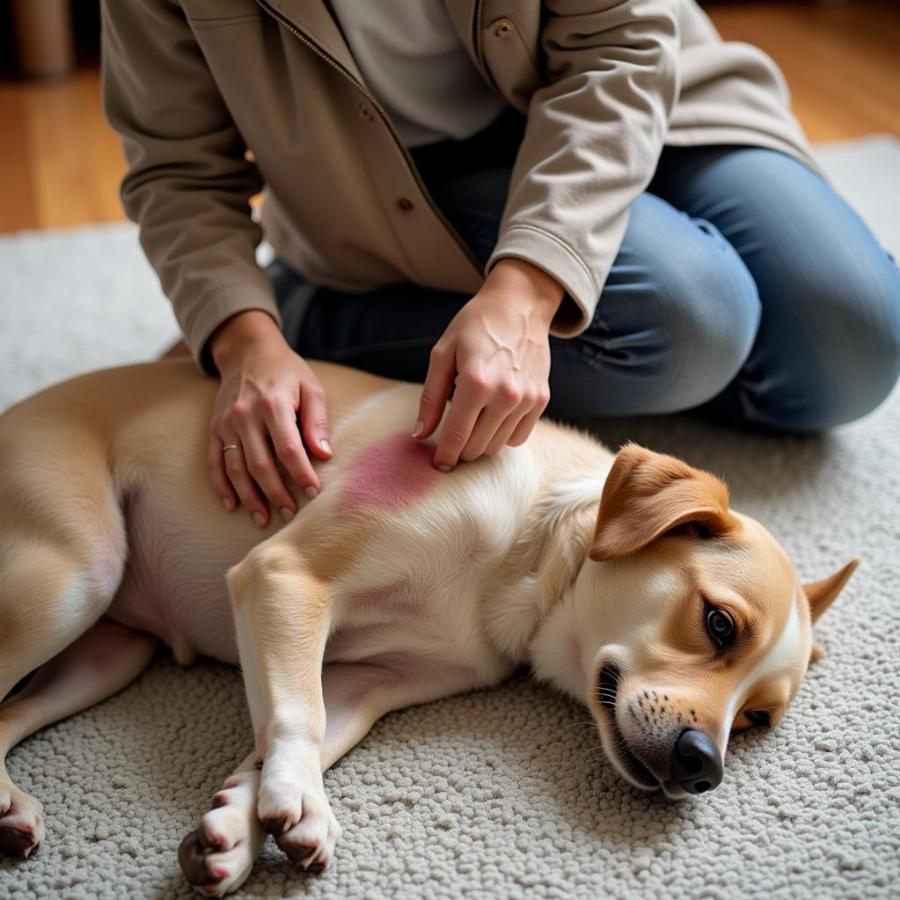As a loving dog owner, you want to ensure your furry friend is always happy and healthy. Just like us, dogs can experience skin irritations, wounds, and other ailments that require topical treatment. That’s where ointment for dogs comes in. However, with so many options available, selecting the right one for your canine companion can feel overwhelming. This comprehensive guide will equip you with the knowledge to make informed decisions about using ointment for dogs.
Understanding Different Types of Ointment for Dogs
Not all ointments are created equal, and choosing the wrong type can worsen the condition or pose risks to your dog’s health. Here’s a breakdown of common types of ointment for dogs and their uses:
-
Antibiotic Ointments: These ointments contain medications like bacitracin or mupirocin that fight bacterial infections. They are commonly used for minor cuts, scrapes, and burns.
-
Antifungal Ointments: As the name suggests, these ointments combat fungal infections, such as ringworm. They often contain ingredients like clotrimazole or miconazole.
-
Anti-inflammatory Ointments: These ointments contain corticosteroids like hydrocortisone that reduce inflammation, itching, and redness. They are often used for allergic reactions, insect bites, and hot spots.
-
Antiseptic Ointments: These ointments help prevent infection by killing bacteria on the skin’s surface. They are often used on minor wounds and abrasions.
-
Healing Ointments: These ointments promote healing and soothe irritated skin. They may contain ingredients like aloe vera, vitamin E, or zinc oxide.
Choosing the Right Ointment for Your Dog’s Needs
Before you apply any ointment to your dog’s skin, it’s crucial to determine the underlying cause of the problem.
Here are some common skin issues in dogs and the appropriate ointment types:
-
Hot Spots: These inflamed, painful sores require a combination of antiseptic, antibiotic, and anti-inflammatory ointments.
-
Dry Skin: Look for healing ointments with moisturizing ingredients like shea butter or coconut oil.
-
Allergies: Anti-inflammatory and antihistamine ointments can provide relief from itching and inflammation.
-
Wounds: Antiseptic and antibiotic ointments are crucial for preventing infections in cuts, scrapes, and burns.
Expert Insight:
“It’s important to remember that what works for one dog may not work for another,” says Dr. Emily Parker, a veterinarian with over 15 years of experience. “Always consult with your vet before starting any new treatment, including topical ointments.”
Applying Ointment to Your Dog Safely
Once you’ve chosen the right ointment, follow these steps for safe and effective application:
- Clean the affected area: Use warm water and a gentle pet-safe soap to remove any dirt or debris.
- Dry the area thoroughly: Pat the area dry with a clean towel.
- Apply a thin layer of ointment: Gently massage the ointment into the skin.
- Prevent licking: Use an Elizabethan collar or other methods to prevent your dog from licking the ointment.
When to Consult Your Veterinarian
While many skin conditions can be treated at home with over-the-counter ointments, it’s essential to seek professional help if you notice any of the following:
- Excessive bleeding
- Signs of infection (pus, swelling, redness)
- No improvement after a few days of treatment
- Your dog seems to be in pain
Frequently Asked Questions About Ointment for Dogs
Can I use human ointment on my dog?
No, it’s not recommended to use human ointments on dogs. Human skin has a different pH balance than dog skin, and some ingredients found in human products can be toxic to dogs.
What if my dog licks the ointment?
If your dog ingests a small amount of ointment, it’s usually not a cause for concern. However, ingesting large amounts can lead to gastrointestinal upset. Contact your veterinarian immediately if your dog shows signs of illness after licking ointment.
How often should I apply the ointment?
The frequency of application depends on the type of ointment and the severity of the condition. Always follow your veterinarian’s instructions or the product label.
Can I use ointment on my dog’s paws?
Yes, there are specific ointments designed for use on dog paws. These ointments help protect paws from dryness, cracking, and harsh weather conditions.
Are there any natural alternatives to ointments?
Yes, several natural ingredients, such as coconut oil, aloe vera, and oatmeal, can soothe and heal minor skin irritations. However, it’s best to consult with your vet before using any home remedies.
 Dog owner applying ointment to their dog's skin
Dog owner applying ointment to their dog's skin
Need More Help?
Choosing the right ointment for dogs can be tricky. If you need further assistance, don’t hesitate to reach out to Beaut Dogs. Email us at [email protected] for detailed and accurate answers to your questions.
Beaut Dogs is your one-stop destination for all things related to show dogs, offering reliable, practical, and in-depth information about the canine world. We provide a wealth of knowledge about the characteristics, temperaments, and care requirements of various dog breeds, from the common to the rare and exotic.
This website covers a wide array of topics, including dog health, nutrition, training, and grooming, alongside expert advice and guidance. We also delve into the legal and financial aspects of dog ownership and provide valuable insights into the adoption process and preparing your home for a new furry friend. Visit Beaut Dogs today to explore the wonderful world of show dogs and discover the best ways to care for your canine companion.